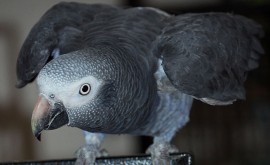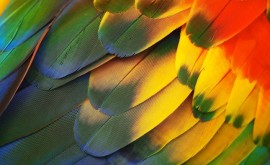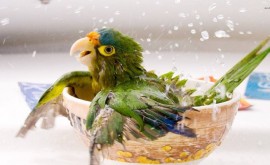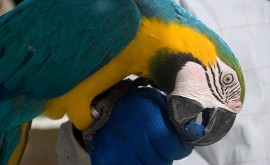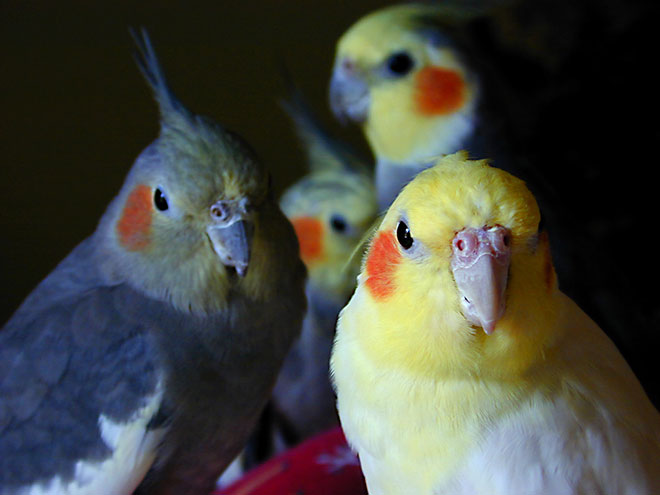 Cockatiels although a small bird are actually a parrot, cousins to the large Cockatoo and both from Australia. They are just 1 of 52 species in Australia but are known to be the fastest flyers in their homeland. They can live up to 20-25 years in captivity and are generally a hardy healthy laid back type of parrot. They don’t require a large cage but if you keep your cockatiel flighted then bigger is always better for maximum exercise while in his cage. Minimum requirements would start at 18″ x 18″.
Cockatiels although a small bird are actually a parrot, cousins to the large Cockatoo and both from Australia. They are just 1 of 52 species in Australia but are known to be the fastest flyers in their homeland. They can live up to 20-25 years in captivity and are generally a hardy healthy laid back type of parrot. They don’t require a large cage but if you keep your cockatiel flighted then bigger is always better for maximum exercise while in his cage. Minimum requirements would start at 18″ x 18″.
Family Rating: With their loving, sweet, and passive personalities it’s no mystery why they are at the top of the list, top 3 actually, for best first time parrot owner’s choice bird as well as best bird for a child. They are relatively quiet, clean, gentle, intelligent,curious, adaptable, easy going and gets along with everyone. I would give cockatiels an A+ for all around best small parrot choice for families and families with children. There are many color mutations but they are all consistent in their reputation.
Talkability/Noise Level: The male cockatiels can talk and whistle fairly well. They are more apt to talk better if shown before whistling show tunes at him. Whistling is close and familiar to their natural language so he will learn to whistle easier than talking. Girls are whistlers too but it’s more random and they’re not adept at learning to whistle songs per se. Noise level for these little parrots is relatively low but when they want you or something they are not shy about vocalizing it. They are not screechers but can let out a high pitch shrill when frightened or startled at night time. They are known for ‘night fright” because they don’t see in the dark and get spooked easily so covering the cage is advisable if it’s something you can do consistently.
Cuddle Score: 100% cuddle bunnies just like their cousin Cockatoo. They love head scratches and kisses and just sitting on their flocks shoulder for homework or some shared meal times.
Hypoallergenic: Since these are cousin to the Cockatoo along with that come a fair amount of powder. The tiels are not a dander free bird and can aggravate allergies or asthma in those who suffer from these symptoms already. It is substantially less than the larger birds but you’ll still need to consider a Hepa filter and proximity of cage to closed in rooms.
Diet: Cockatiels in the wild are ground foragers, meaning that they fly to the ground to forage for food. A companion cockatiel will happily eat from a bowl, but it will also enjoy “foraging” for treats hidden in shreddable toys left at the bottom of her cage. They are curious creatures so challenging them each day with hidden food or treats is a great way to keep boredom to a minimum.
Most would say a seed diet is perfectly fine for a cockatiel but as with all things in life “everything in moderation” and they eat the way we eat, variety. We wouldn’t ask for Cheerios for breakfast, lunch and dinner, well guess what, neither do they.
So like all companion parrots and exotic birds offer a variety. If you do plan to feed your cockatiel seeds then please consider the following in addition and do it young or they can become very picky eaters.
Veggies
Sprouts, Spinach, Turnip Greens, Swiss chard, Mustard Greens, Broccoli, Escarole, Chicory, Tomatoes, Beet Greens, Bok Choy, Grated Carrots, Collard greens, Corn on the Cob, Endive, Kale, Yams, Pumpkin, Sweet potato, (cockatiels like Yams, Pumpkin and Sweet Potato better when they are cooked).
Fruits
Mangos, Cantaloupe, Apricots, Nectarines, Papayas, Peaches Apples, Bananas, Grapes, Oranges. Make sure your cockatiel does not have any seeds from fruits, some can be very dangerous, like Cherry pits as they may contain trace amounts of cyanide.
Protein and Meat
It’s OK for your cockatiel to eat chicken, fish or beef, again we are talking here very small amounts. Other sources of protein are cooked eggs (hard boiled or scrambled), yogurt, cottage cheese and peanuts.

